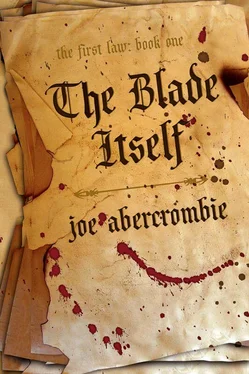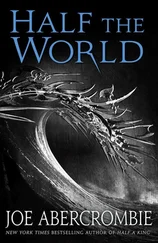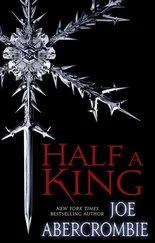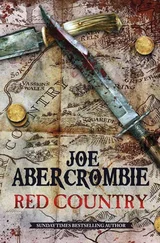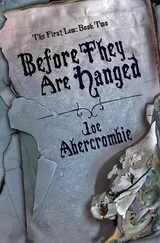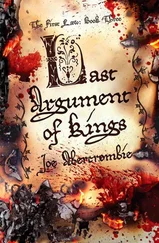“And Bethod means to make war on this?” he whispered. “He must be mad.”
“Perhaps. Bethod, for all his waste and pride, understands the Union.” Bayaz nodded towards the city. “They are jealous of one another, all those people. It may be a union in name, but they fight each other tooth and nail. The lowly squabble over trifles. The great wage secret wars for power and wealth, and they call it government. Wars of words, and tricks, and guile, but no less bloody for that. The casualties are many.” The Magus sighed. “Behind those walls they shout and argue and endlessly bite one another’s backs. Old squabbles are never settled, but thrive, and put down roots, and the roots grow deeper with the passing years. It has always been so. They are not like you, Logen. A man here can smile, and fawn, and call you friend, give you gifts with one hand and stab you with the other. You will find this a strange place.”
Logen already found it the strangest thing he had ever seen. There was no end to it. As their boat slipped into the bay the city seemed to grow more vast than ever. A forest of white buildings, speckled with dark windows, embracing them on all sides, covering the hills in roofs and towers, crowding together, wall squashed to wall, pressing up against the water on the shoreline.
Ships and boats of all designs vied with each other in the bay, sails billowing, crewmen crying out over the noise of the spray, hurrying about the decks and crawling through the rigging. Some were smaller even than their own little two-sailed boat. Some were far larger. Logen gawped, amazed, as a huge vessel ploughed through the water towards them, shining spray flying from its prow. A mountain of wood, floating by some magic in the sea. The ship passed, leaving them rocking in its wake, but there were more, many more, tethered to the countless wharves along the shore.
Logen, shielding his eyes against the bright sun with one hand, began to make out people on the sprawling docks. He began to hear them too, a faint din of voices crying and carts rattling and cargoes clattering to the ground. There were hundreds of tiny figures, swarming among the ships and buildings like black ants. “How many live here?” he whispered.
“Thousands.” Bayaz shrugged. “Hundreds of thousands. People from every land within the Circle of the World. There are Northmen here, and dark-skinned Kantics from Gurkhul and beyond. People from the Old Empire, far to the west, and merchants of the Free Cities of Styria. Others too, from still further away—the Thousand Islands, distant Suljuk, and Thond, where they worship the sun. More people than can be counted—living, dying, working, breeding, climbing one upon the other. Welcome,” and Bayaz spread his arms wide to encompass the monstrous, the beautiful, the endless city, “to civilisation!”
Hundreds of thousands. Logen struggled to understand it. Hundreds… of thousands. Could there be so many people in the world? He stared at the city, all around him, wondering, rubbing his aching eyes. What might a hundred thousand people look like?
An hour later he knew.
Only in battle had Logen ever been so squashed, hemmed, pressed by other people. It was like a battle, here on the docks—the cries, the anger, the crush, the fear and confusion. A battle in which no mercy was shown, and which had no end and no winners. Logen was used to the open sky, the air around him, his own company. On the road, when Bayaz and Quai had ridden close beside him, he’d felt squeezed. Now there were people on every side, pushing, jostling, shouting. Hundreds of them! Thousands! Hundreds of thousands! Could they really all be people? People like him with thoughts and moods and dreams? Faces loomed up and flashed by—surly, anxious, frowning, gone in a sickening whirl of colour. Logen swallowed, blinked. His throat was painfully dry. His head span. Surely this was hell. He knew he deserved to be here, but he didn’t remember dying.
“Malacus!” he hissed desperately. The apprentice looked round. “Stop a moment!” Logen pulled at his collar, trying to let some air in. “I can’t breathe!”
Quai grinned. “It might just be the smell.”
It might at that. The docks smelled like hell, and no mistake. The reek of stinking fish, sickly spices, rotting fruit, fresh dung, sweating horses and mules and people, mingled and bred under the hot sun and became worse by far than any one alone.
“Move!” A shoulder knocked Logen roughly aside and was gone. He leaned against a grimy wall and wiped sweat from his face.
Bayaz was smiling. “Not like the wide and barren North, eh, Ninefingers?”
“No.” Logen watched the people milling past—the horses, the carts, the endless faces. A man stared suspiciously at him as he passed. A boy pointed at him and shouted something. A woman with a basket gave him a wide berth, staring fearfully up as she hurried by. Now he had a moment to think, they were all looking, and pointing, and staring, and they didn’t look happy.
Logen leaned down to Malacus. “I am feared and hated throughout the North. I don’t like it, but I know why.” A sullen group of sailors stared at him with hard eyes, muttering to each other under their breath. He watched them, puzzled, until they disappeared behind a rumbling wagon. “Why do they hate me here?”
“Bethod has moved quickly,” muttered Bayaz, frowning out at the crowds. “His war with the Union has already begun. We will not find the North too popular in Adua, I fear.”
“How do they know where I’m from?”
Malacus raised an eyebrow. “You stick out somewhat.”
Logen flinched as a pair of laughing youths flashed by him. “I do? Among all this?”
“Only like a huge, scarred, dirty gatepost.”
“Ah.” He looked down at himself. “I see.”
Away from the docks the crowds grew sparser, the air cleaner, the noise faded. It was still teeming, stinking, and noisy, but at least Logen could take a breath.
They passed across wide paved squares, decorated with plants and statues, where brightly-painted wooden signs hung over doors—blue fish, pink pigs, purple bunches of grapes, brown loaves of bread. There were tables and chairs out in the sun where people sat and ate from flat pots, drank from green glass cups. They threaded through narrow alleys, where rickety-looking wood and plaster buildings leaned out over them, almost meeting above their heads, leaving only a thin strip of blue sky between. They wandered down wide, cobbled roads, busy with people and lined with monstrous white buildings. Logen blinked and gaped at all of it.
On no moor, however foggy, in no forest, however dense, had Logen ever felt so completely lost. He had no idea now in what direction the boat was, though they’d left it no more than half an hour ago. The sun was hidden behind the towering buildings and everything looked the same. He was terrified he’d lose track of Bayaz and Quai in the crowds, and be lost forever. He hurried after the back of the wizard’s bald head, following him into an open space. A great road, bigger than any they’d seen so far, bounded on either side by white palaces behind high walls and fences, lined with ancient trees.
The people here were different. Their clothes were bright and gaudy, cut in strange styles that served no purpose. The women hardly seemed like people at all—pale and bony, swaddled in shining fabric, flapping at themselves in the hot sun with pieces of cloth stretched over sticks.
“Where are we?” he shouted at Bayaz. If the wizard had answered that they were on the moon, Logen would not have been surprised.
“This is the Middleway, one of the city’s main thoroughfares! It cuts through the very centre of the city to the Agriont!”
“Agriont?”
“Fortress, palace, barracks, seat of government. A city within the city. The heart of the Union. That’s where we’re going.”
Читать дальше
